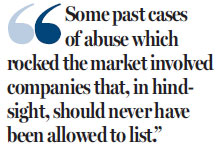IPO reform needed to prevent stock market irregularities
Updated: 2016-11-16 09:29
By Peter Liang(HK Edition)
|
|||||||||
While the debate on IPO reform continues to rage, the new enforcement head of the Securities and Futures Commission (SFC) has reiterated the watchdog agency's efforts in clamping down on stock market irregularities that have threatened to undermine Hong Kong's reputation as an international financial center.
Such an affirmation from the SFC is significant at a time when the stock exchange is, as one local newspaper puts it, "working flat out" to entice more foreign company listings, especially those in the so-called new-economy sector. Speaking at a public forum, Charles Li, chief executive of Hong Kong Exchanges and Clearing (HKEx), which has the monopoly on the stock exchange, said the listing of international stocks can attract more mainland investment funds to the local bourse.
"Over 60 percent of listed companies on the Hong Kong stock market are mainland firms. Mainland investors clearly like to invest in our stocks but they would like to invest in more international stocks which are not available on the mainland," Li said.

Obviously, he was expressing a consensus view of members of the stock exchange. But there is a large contingent of local stockbrokers who have refused to recognize that to attract quality foreign companies to list, Hong Kong will need to beef up its regulatory efforts to ensure market transparency and a level playing field for all.
Cases of irregularities among the newly listed companies are on the rise. The increased risk of being tarred by the same brush will certainly give pause to international companies considering to list in Hong Kong.
The deteriorating situation has prompted the SFC, together with the listing committee of the stock exchange, to work out a proposed reform which focuses on the scrutiny of applications for initial public offerings on the stock exchange. The proposal to involve the SFC in the early stages of the approval process is vigorously contested by some of the largest local stock brokerage firms.
Opponents of the proposed IPO reform have charged that the government and the SFC have refused to listen to their complaints that the change would harm their livelihood. If that is the case, the SFC is right in rejecting such absurd argument which suggests that the stockbrokers are making a living on market irregularities.
In fact, the reform proposal makes no mention of any material change to the rules governing IPOs in Hong Kong. The proposed involvement of the SFC is designed to help ensure that those rules are being properly interpreted and applied in the approval process, which will remain in the hands of the stock exchange committee.
A major shortcoming of the existing system is that the SFC would get involved only in investigation and enforcement after those rules are suspected to have been abused by the offending companies and their executives, resulting in losses to investors. By then, punishing the offenders would do little in repairing the soiled reputation of the Hong Kong market.
Other market irregularities are also on the rise, making the need for swift and effective action against them much more pressing than before. Official figures show that in the first nine months of 2016, the SFC handled 250 cases of market irregularities, involving corporate negligence, improper disclosure, insider trading and market manipulation, 80 percent of the 2015 total. Of that, 128 cases were prosecuted, the highest in five years.
In a speech at Thomson Reuters Seventh Pan Asian Regulatory Summit in Hong Kong, Tom Atkinson, the newly appointed executive director of enforcement of the SFC, said that corporate fraud and misconduct has wiped out a total of about HK$200 billion in market capitalization. "At the top of our priorities are listed company-related issues. We are particularly concerned about risks posed by corporate fraud and misfeasance, market manipulation and intermediary misconduct," Atkinson said.
Some past cases of abuse which rocked the market involved companies that, in hindsight, should never have been allowed to list. The unfortunate fact that they succeeded in slipping through has shown up the holes in the approval process. These holes need to be plugged; the proposed IPO reform is seeking to do exactly this.
Certainly, stockbrokers who objected so vehemently to reform must have heard this old adage: Prevention is better than cure.
The author is a veteran current affairs commentator.
(HK Edition 11/16/2016 page8)